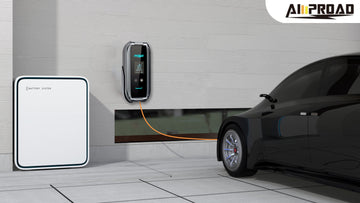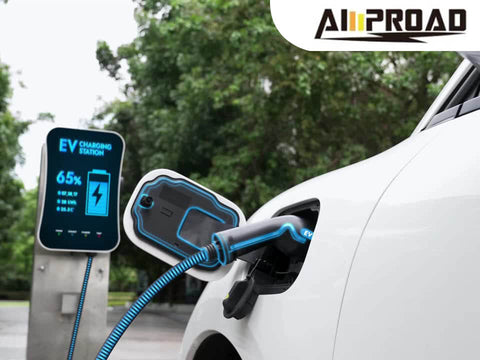
The era of electric vehicles (EVs) or "new energy" vehicles is upon us, and with it comes a new set of considerations for preserving the longevity and performance of these vehicles' batteries. The following are several behaviors that can harm EV batteries, so take a moment to see if you've been guilty of any of these practices.
First, frequent use of fast charging or supercharging ports. While fast charging is designed to accelerate the charging efficiency over a short period, it also increases the battery temperature and accelerates the polarization of the cells within the battery pack. This fast-charging process can negatively impact the battery's overall lifespan. To avoid placing too much stress on your EV's battery, try to rely primarily on slower, Level 1 (110V) charging whenever possible, reserving the use of fast charging stations for when you truly need a quicker charge.
Second, allowing the battery to become almost fully depleted before charging. This behavior is detrimental to battery life. When an EV's battery is charged from a very low state of charge, especially when it's nearly exhausted, the charging speed is faster, the charging voltage is higher, and the charging current is more substantial. This aggressive charging state causes the battery temperature to rise significantly, potentially leading to permanent damage or degradation.
Additionally, allowing the battery to become excessively discharged before recharging can also shorten its lifespan. It's generally recommended to recharge an EV's battery before it drops below 20% state of charge to avoid subjecting the cells to excessive depletion.
Third, prioritizing the ultimate driving experience over battery longevity. Because electric vehicles offer smooth, responsive acceleration, many owners prefer to engage sport or performance driving modes. However, while these modes may enhance the driving experience, they also place greater demands on the battery, potentially shortening its lifespan. Adopting a gentler, more efficient driving style can help extend the battery's overall lifespan and reduce the strain on its cells.
Fourth, exposing the battery to extreme temperatures. Using an EV or its charging system when the ambient temperature is excessively high or low can also significantly impact battery life. Extreme temperatures can accelerate the degradation of the battery cells, so it's essential to operate and charge your EV within the manufacturer's recommended temperature range whenever possible.
Finally, neglecting regular battery maintenance. While it's true that EVs require less maintenance than traditional gasoline-powered vehicles, regular battery care and monitoring are still crucial. Most manufacturers recommend an initial battery inspection or service around the 5,000-mile mark, followed by subsequent maintenance every 10,000 miles or as specified in the owner's manual. These regular checkups can help identify potential issues early and ensure the overall health and longevity of your EV's battery pack.

With these battery-harming behaviors in mind, many prospective EV owners wonder: "To buy a new energy vehicle, must I install a charging station at home?"
While not an absolute requirement, installing a dedicated home EV charger is often the best option for most EV owners. These charging units not only minimize electricity consumption during charging but also contribute to extending the lifespan of your EV's battery by providing a controlled, consistent charging environment.
A home EV charger, also known as a Level 2 EV charger, is designed for faster recharging than the portable Level 1 chargers that come standard with most electric vehicles. Not only are home EV chargers more affordable in the long run than relying solely on public charging stations, but they also offer better performance and cause less strain on the battery compared to frequently using public DC fast chargers.
For Tesla owners, the Tesla Destination Charger network provides a convenient charging solution when traveling or visiting certain locations. These chargers are installed at various destinations, such as hotels, restaurants, and shopping centers, allowing Tesla drivers to top up their batteries while stopped at these locations for an extended period. While slower than Tesla's Supercharger network, the Destination Chargers offer a practical option for adding range during longer stops.
Non-Tesla EV owners can take advantage of the growing network of public Level 2 and DC fast charging stations across North America. Level 2 chargers, similar to home EV chargers but designed for public use, provide a moderate charging speed, while DC fast chargers can deliver a significantly faster charge, albeit at a higher cost per charging session.
Additionally, portable EV charger can serve as a useful backup option or a solution for those who cannot install a dedicated home EV charger. These compact and lightweight chargers can be plugged into a standard 120-volt outlet, providing a slower but still useful charge when needed. While not as convenient as a dedicated home EV charger, portable EV chargers can be a valuable addition to an electric vehicle owner's charging toolkit, especially for those who frequently travel or need charging flexibility.
When it comes to choosing the best home EV charger, AMPROAD, a North American manufacturer dedicated to providing high-quality EV charging solutions, stands out as a top choice. AMPROAD's line of EVSE home EV chargers is designed to make your electric vehicle ownership experience more convenient and efficient.
One of AMPROAD's flagship products is the iFlow P9 EV Charger, a Level 2 charging solution that meets the criteria for an ideal home EV charger. This charger is adjustable from 10A to 16A, 24A, 32A, and 40A, ensuring compatibility with a wide range of electric vehicles and providing efficient charging speeds tailored to your specific needs.

The iFlow P9 boasts a 25-foot-long cable, exceeding the recommended minimum length and ensuring that you can easily reach your vehicle's charging port, even in larger garages or parking spaces. It features the industry-standard J1772 plug with a NEMA 14-50 connection, offering the option for either plug-in or hardwired installation, depending on your preference and needs.
Safety is a top priority for AMPROAD, and the iFlow P9 EV Charger reflects this commitment. It features robust leakage protection and high-temperature protection, ensuring safe operation even when used outdoors and exposed to harsh conditions such as dust, rain, and extreme temperatures. Furthermore, the charger is certified by Nationally Recognized Testing Laboratories, meeting strict safety and compliance standards.
In terms of warranty, the AMPROAD iFlow P9 EV Charger comes with a one-year warranty, providing peace of mind and protection against defects or unexpected failures during the first year of use. However, AMPROAD is known for its commitment to quality and customer satisfaction, so you can expect reliable performance and longevity from this home EV charger.
As the adoption of electric vehicles continues to grow, having a reliable and efficient home EV charger is becoming increasingly important for owners. By considering factors such as maximum current rating, cable length, plug type or hardwiring, certification, warranty, and outdoor compatibility, you can make an informed decision and choose a home EV charger that meets your specific needs and provides a seamless charging experience.
Whether you're a Tesla owner taking advantage of the Destination Charger network, a non-Tesla EV owner relying on public charging stations, or someone who needs the flexibility of a portable EV charger, having a dedicated home EV charger like the AMPROAD iFlow P9 can offer unparalleled convenience and peace of mind.
By following best practices for preserving your EV's battery life, such as avoiding frequent fast charging, preventing excessive depletion, adopting an efficient driving style, operating within recommended temperature ranges, and maintaining regular battery maintenance, you can extend the lifespan and performance of your electric vehicle's battery pack.
Investing in a high-quality home EV charger from a reputable manufacturer like AMPROAD not only streamlines the charging process but also contributes to the overall longevity of your EV's battery by providing a controlled, consistent charging environment. With its advanced features, safety certifications, and commitment to quality, the AMPROAD iFlow P9 EV Charger is a top choice for anyone looking to embrace the future of electric mobility while ensuring a reliable and efficient charging solution at home.


